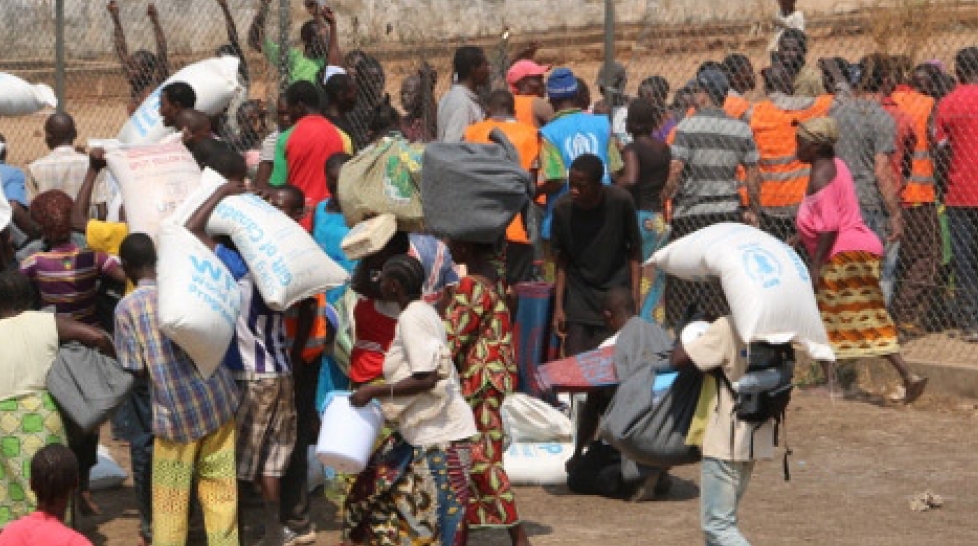Bernie Sanders said the pandemic shows “that we have got to act as a global community — we truly are all in this together,” Jake Johnson reports.

Aid distribution point in Bangui, Central African Republic. (UN Office for the Coordination of Humanitarian Affairs)
 Sen. Bernie Sanders and Rep. Ilhan Omar led a group of more than 300 lawmakers from around the world last Wednesday in calling on political leaders and global financial organizations — including the International Monetary Fund and the World Bank — to fully cancel the debt that is shackling poor nations as they work to combat the coronavirus crisis and avert total economic devastation.
Sen. Bernie Sanders and Rep. Ilhan Omar led a group of more than 300 lawmakers from around the world last Wednesday in calling on political leaders and global financial organizations — including the International Monetary Fund and the World Bank — to fully cancel the debt that is shackling poor nations as they work to combat the coronavirus crisis and avert total economic devastation.
“This is a global economic and public health crisis unlike any we have seen in our lifetimes,” Omar, a Minnesota Democrat, said in a statement. “We as a global community must seize this opportunity to get relief to those who are suffering by cancelling debt for nations who cannot afford it. As the largest contributor to the IMF and the leading force behind the establishment of the World Bank, the United States should take the lead in this effort.”
Sanders, a senator from Vermont, warned that without sweeping relief, poor nations could be forced to “dedicate money that should be going towards protecting the health and safety of their people to pay off unsustainable debts.”
“We cannot allow these countries to be deprived of the resources they need to purchase food, medicine, protective gear, and medical equipment,” said Sanders. “The steps that our international coalition of lawmakers is proposing are not radical. It is the very least that these financial institutions should do to prevent an unimaginable increase in poverty, hunger, and disease that threatens hundreds of millions of people.”
>>Please Donate to CNs’ 25th Anniversary Spring Fund Drive<<
The lawmakers’ letter (pdf) was sent Wednesday to World Bank president David Malpass and IMF managing director Kristalina Georgieva and also forwarded to world leaders, including U.S. President Donald Trump, U.K. Prime Minister Boris Johnson, and Canadian Prime Minister Justin Trudeau.
The letter’s demand for debt cancellation—not merely temporary suspension and deferment—for more than 70 International Development Association (IDA) countriesas well as an urgent infusion of financial support was backed by hundreds of lawmakers from more than two dozen nations, including Spain, Mexico, Brazil, Peru, France, Italy and Argentina.
“We call on all G-20 leaders through these [international financial institutions] to support the cancellation of debt obligations held by all IDA countries during this unprecedented pandemic,” the letter reads. “The vulnerable communities that lack the resources and privileges to adopt adequate public health measures will ultimately face the disproportionate burden of coronavirus.”
“We also urge you to support a major issuance of Special Drawing Rights (SDRs) in order to provide developing countries with urgent financial support,” the letter continues. “An issuance of SDRs on the order of trillions of dollars will be required to avert major increases in poverty, hunger and disease.”

World Bank headquarters in D.C. (Bruno Sanchez-Andrade Nuño, Flickr)
As the Washington Post‘s Ishaan Tharoor wrote Wednesday, the coronavirus crisis “has underscored the stark depths of global inequality: Even before the pandemic hit, 64 countries spent more in servicing their debts to richer countries, multilateral organizations such as the IMF, and private lenders than they did on the healthcare of their own people.”
Sanders said Wednesday that the Covid-19 pandemic shows “that we have got to act as a global community—we truly are all in this together.”
“That means protecting the most vulnerable amongst us,” said Sanders.
Read the full letter below:
“Dear President Malpass and Managing Director Georgieva:
Members of Parliaments across the world are writing to request extensive debt forgiveness for International Development Association (IDA) countries by all major international financial institutions (IFIs) during this global COVID-19 crisis.
We are pleased to see that the World Bank Group (WBG) and International Monetary Fund (IMF) have already taken steps to implement debt relief and suspension for the world’s poorest countries. The recent IMF announcement of temporary debt relief funding for 25 member countries is an encouraging development but much more widespread and long term support is still needed.
That is why we call on all G-20 leaders through these IFIs to support the cancellation of debt obligations held by all IDA countries during this unprecedented pandemic. The temporary suspension and deferment of debt will not be sufficient to help these countries fully prioritize the prompt and sustainable management of the crisis at hand. The vulnerable communities that lack the resources and privileges to adopt adequate public health measures will ultimately face the disproportionate burden of coronavirus. Such harm means that global supply chains, financial markets, and other interconnected exchanges will continue to be disrupted and destabilized.
We also urge you to support a major issuance of Special Drawing Rights (SDRs) in order to provide developing countries with urgent financial support. The pandemic-triggered economic crisis is expected to be far more devastating than the global financial crisis of 2009, when SDRs were last deployed. We concur with Managing Director Georgieva’s “lower-end” estimate of $2.5 trillion for the current financial needs of developing countries. An issuance of SDRs on the order of trillions of dollars will be required to avert major increases in poverty, hunger and disease.
Therefore, not only do we have a humanitarian duty to aid our petitioning countries in dire need, but we also have a common, vested interest to support comprehensive relief for effective recovery and resiliency. As a collaborative international community, we can only begin to move past this pandemic once this pandemic ends for everyone.
For those reasons, we urge the WBG and IMG to take strong leadership to provide extensive debt relief and financial assistance for all impoverished nations most at risk of the devastating human costs and the long-lasting economic injuries of COVID-19. We ask that you work with relevant bilateral and multilateral partners to provide a response no more than 15 days after receipt of this letter.
It is in our shared public health, security, and economic interests that we come together and act boldly to assist the most vulnerable nations among us. We stand ready to work with you and support immediate and long-term solutions to ensure fragile, destitute countries receive the flexibility and guidance they need in order to prevent humanitarian crises, protect public health, and promote global stability during this crisis and well after it is over for affluent nations.”
Jake Johnson is a staff writer for Common Dreams. Follow him on Twitter: @johnsonjakep
This article is from Common Dreams.
>>Please Donate to CNs’ 25th Anniversary Spring Fund Drive<<

Special Drawing Rights?
A contrived misleading term for a world-dominance currency issued many years ago by the IMF but little used.
Once again Bernie displays his weakness concerning international affairs and AOC complete ignorance of economics. They are pushing Modern Monetary Theory. An analogy would be peddling heroine.
Sam F. from elmerfudzie. It is because of corruption, that citizens at large are returning to conservative notions of states rights (USA), nullification of federal jurisdiction, denouncing any proclamations of broad statutory authority such as the Patriot Act or Presidential Executive Orders. A palpable individualism is now on the horizon. This idea of individual responsibility has returned to the political scenery. Oddly enough it is coupled with a collective grass roots movement loosely referred to as boycott and divestment. A local community effort, launched against a specific country, finished products or services. The proles are becoming increasingly independent of mass media opines, official government intervention, even on the smallest of local matters. Who writes to their Senator anymore? expects the FBI or INTERPOL to investigate and prosecute some thugs that have drifted into Anytown, USA? We know we’re on our own and can expect nothing from centralized government. John Doe is keeping his powder dry and making way for State owned banks (like North Dakota) for local commerce. That said, I can assure you that any attempt by the Federal Reserve or the Belt Way Busybodies to confiscate gold or silver, or deny it’s use as coinage will be met with armed insurrection and revolution.
Elmer, I’m glad to hear that you see militant individualism growing, although less visible to me.
I do write to my (independent) Senator in Maine, although he too may have drunk the KoolAid.
It will be interesting to rebuild the sense of need for federalism from the need for individualism.
Many of the states are clearly just as corrupt as the federal government, often more casually so.
@elmerfudzie 52020 17:24
I hope what you are sensing is the reality on the ground. Hard to tell.
I do know this because it is personal. I don’t have many silver coins, but I have a few nice 1 oz ones. I have a bunch of coins with silver in them in a very old large glass jar (~5 gallons) that I have been saving over the last few decades. Most of them are US coins and some of them are from before and around 1965. Several of these contain silver.
If anybody tried to confiscate that glass jar, I guess I would go ahead and get a gun so that I could defend my property. Same goes for the other coins. Oh, as an aside, I also enjoy the website of Dr. Paul (Institute for Peace and Prosperity).
Peace,
BK
Specific debt relief measures may offer temporary relief, but wealthy states fear unwise use of international debt.
Better global coordination is necessary to establish equal opportunities and basic services, and to reduce militarism.
This can be provided best by a world economic and military federation, a democracy empowered to:
1. Tax world trade of members to fund health, education, employment opportunity, and welfare as needed;
2. Take possession of mineral, fisheries, and other natural wealth, and heavily tax trade in outside resources;
3. Command the armed forces of members, assure military safety, and stop foolish threats and military spending;
4. Tax trade with non-members, and embargo external rogues as needed.
One potential problem is the difficulty of reforming such federations once corrupted, as in the case of the US.
So it is essential that the constitution be better written than that of the US, to provide safeguards against corruption:
1. Protecting the institutions including mass media from economic power, via election funding, direct bribes, etc.;
2. Providing far better checks and balances, such as multiple cross-checking administrations in each functional area;
3. Monitoring officials of government and mass media and their associates for life, for economic and other influence;
4. Providing a far better judicial system, protected against corruption and bias, with multiple redundant appeals, etc.
5. Provide many checks against abuses of secret agencies, military powers, executive powers, etc.
6. The federation should supercede its member states in central functions, leaving them only local sovereignty.
The motivation to form a federation is strongest where it has an enemy, as when the US and India were formed.
But the greatest military savings will occur as the federation grows larger than the remaining powers
@Sam F
That is why a confederation is better than a federation.
Federal governments have a tendency to get too big for their own good.
Survival of the fittest is what I think when it comes to governance, but that might not actually be what you think it is…..cause usually as Kropotkin espoused and I agree, the fittest know how to work together in small communities. Simple and it is in our DNA!
Sam F from elmerfudzie. Corruption rampant? an emphatic yes. I too wrote to my State Senator, a hand written note(s), only to get a thank you and response letter from him on a completely unrelated matter, one I never broached. In effect a block form letter head and response for suckers like me. What really knocked me down, politically speaking, not to mention stirred my re entry into this election frenzy was Ron Paul MD. A privileged white, upper middle class, six figure salaried surgeon and ditto for being a US Representative, calling for a proletariat type revolution against our government? Wow, got me thinking you know..
Yes, Elmer, Ron Paul is a good example of a moral libertarian without anarchism, although I contest his anti-quarantine posture during the epidemic, despite its value in raising consciousness of real government wrongdoing. As I imagine you may be, I too am a six-figure philanthropist without pretension, and prefer modest living circumstances with the knowledge that I have done my best for humanity. But oddly enough such folks do not always know or agree on just how they got that way.
Buffalo_Ken, Empowerment of those who “know how to work together in small communities” is sensible, as long as they or their organization also know how to coordinate larger-scale policies such as coordination of taxation/support, trade, etc. Not to play with terminology, federal vs. confederal (weaker federation) governments “have a tendency to get too big” when they tend to get corrupted by special interests. What do you think of a (con)federation that publicly debates with popular votes on all policies, vs. a representative congress that pretends to do that, but is really governed by the wealthy or for bribes through its political parties?
Which of course would have controls against corruption, prevent funding of mass media and elections except by registered and limited individual donations, and better checks and balances, etc.
I am working on a College of Policy Debate that could do this along with a Congress, or could supplant the Congress if augmented to conduct policy voting. It will conduct textual debates among experts with all viewpoint protected, producing debate summaries commented by all sides, for public access with mini-quizzes and subject-area comprehension scoring for participants, which could be a voter qualification. It should be a fourth branch of federal government.
@Sam F 52220 10:14
I’m interested in the “College of Policy Debate”. I look forward to reading more about this. I enjoy reading your posts. I think a Constitutional Convention would actually be a potentially wonderful and useful thing for all of us in the US! It could be.
However, I also think that once the “Scale of Proportion” relatively speaking (with respect to “impact” on individual lives) gets beyond a certain threshold, then it becomes more and more difficult for any large scale entity to not succumb to “special interests” – because it is still just a few individuals making the decisions even for large scale entities and we all have weaknesses. It is not a given that they will succumb, but it should be obvious by now that many in the current time already have and there is no going back for them. Some lines can only be crossed once if you are a “Large Scale Entity”……..because just crossing the line one time could result in great calamity. Other times you get a free pass, but after awhile if it is just too obvious, then something has got to change. Don’t you think?
That is why small scale is usually better from my perspective. Additionally, in general, the fewer the restrictions the better, but lately, it seems as if the whole world is in some sort of hyper flux rule making frenzy! Its not natural and it won’t work. At some point, “the commons” will decide what rules make sense and what doesn’t unless of course…….they don’t. In which case, they must all be puppets and then I suppose they will get what their “masters” think they deserve…..what a shame that would be because I’m amongst them and I know what the so-called “masters’ think because evidence is evidence. I know this as well. They are not pulling the strings that they think they are…..hard lessons on the way for them is how it seems to me, but I could be biased in my view.
Oh well, sometimes in history there are times of transition. I think we have definitely entered one in the Year of 2020 and I think this will be a good thing.
BK